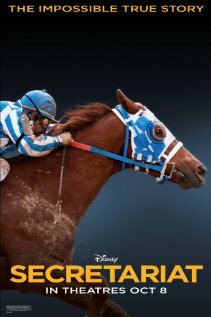James Cromwell, the Oscar-nominated actor who famously said “That’ll do, pig” in 1996′s Babe, now plays millionaire horse trainer Ogden Phipps in Disney’s Secretariat. He stars across from Diane Lane as Penny Chenery, the courageous owner of the titular racehorse that has often been described as the greatest of all time.
Phipps was a wealthy and influential player in the racing world at the time the movie is set—the 70s, while John Malkvoich stars as trainer Lucien Laurin.
Below is a Q&A with James Cromwell conducted in-house by Disney. Secretariat is available in Australia on Disney Blu-Ray and DVD August 1oth, 2011.
—
Q: What do you think is the overall appeal of this story? It’s obviously a rousing, uplifting story.
A: There is the story of the horse, Secretariat, an incredible athlete who was given the opportunity and the training to accomplish what he was destined to do. And the hero of the picture is Penny Chenery who was a housewife. Penny’s job was to take care of her man, to do the laundry, pick up the kids, buy the groceries and cook the food. That was the way women in 1973 — and to some degree right now too — were seen in our culture. But Penny was also a formidable presence in horseracing and it is her struggle that is so interesting. So on the one hand you have the story of the horse, which appeals to everybody, young and old. On the other hand, you have the journey of this woman on the road towards her own fulfillment, at the risk of her own marriage and facing the alienation of her community. So it is a wonderful story of struggle and triumph.
Q: How did Penny Chenery get to beat Ogden Phipps at his own game in that crucial coin toss, even though he was the powerful and experienced player?
A: Ogden Phipps was damn sure of himself in terms of the decision he’d made in that coin toss. But these guys who had the best advice and the most money basically got suckered by a housewife. She made a great choice, took a risk, but had a better understanding of the bloodlines than he did.
Q: What did you find interesting about your character, Ogden Phipps?
A: What I didn’t realize before taking this role was that he was actually one of the richest men in the world; Ogden Phipps was a very influential man. So if you think rich people are inherently interesting [laughs] this man was interesting. His grandfather was a partner of Carnegie Steel and when Carnegie was bought out by Mellon; his share was $50 million and that $50 million would probably be worth about $500 million today. They invested it and the family was inordinately wealthy. His mother raised horses and he got involved in it too. He was always under the thrall of his mother, who was a formidable lady.

Q: What was Phipps like as a man?
A: He was very quiet. I understand from Bill Nack who wrote the book Secretariat: The Making of a Champion, that he was very shy, he never unbuttoned his coat, he played perpetually with the change in his pocket, he was very soft-spoken. The movie depicts him as somewhat of a ‘good old boy’, if you know that expression. So I made him slightly Southern, because although he was from the North, I think people from the North tended to pick up a little of the regional dialect in order to fit in, when they came down to the South. They did not want to stick out like a sore thumb. He was very, very knowledgeable. He surrounded himself with really knowledgeable people. He learned a great deal and become very sophisticated in the breeding of horses and was successful. He certainly was not in racing for the money. He was in it because of the nature of the sport, the glamour, but I think primarily because of his competitive instinct.
Q: Was it also the exhilaration of the sport that he loved, do you think?
A: I am sure he was in it for the fun, but fun means something different to different people. Fun is only a mild interest for some people. You need to be extraordinarily competitive for racing. These are the titans of America who are competing in this rarified arena; these are the people who own America. And in order to find relief, they often create events like yacht racing or horse racing. You think ‘yacht racing, gosh how lovely, all the boats are beautiful’. No no, it is ‘kill or be killed’. They will do anything to win. It’s all about winning, so that when you go to the club next time, you can say, ‘I’m sorry about that, old boy. Better luck next time.’ So I think that’s what it was like with horse racing too at that time for Phipps.
Q: Racing was really still a man’s world in the ‘70s wasn’t it?
A: It was. One scene in the film was primarily for me to tell Penny “you’re a woman and you don’t know anything and I know better than you and if your horse screws up, I’m going to take it away from you.” The whole scene is avuncular. He respects Penny but she is not a member of the elite club. I think everybody in America was a chauvinist at that time, just like many people were racists.
Q: How did you prepare for this role? Did you already have some knowledge about horse racing?
A: My father John Cromwell was an actor and director and he also had race horses in California so I learned quite a bit growing up. I don’t follow horse racing because I’m an animal rights activist and we activists have a little problem with horse racing; but I did my research. I went onto the Internet and I watched Secretariat’s races. I especially enjoyed watching The Belmont Stakes. I found it very moving. It’s pretty incredible actually. I can see why people did cry when they watched it.
Q: How closely based on fact is your own performance?
A: There’s always a problem when you do a piece of fiction based on a true story, because you really have to let the reality go. The writer has to let the reality go, because what actually happened is not always as dramatic as you need your script to be. So in my case, I can’t play my character as a shy, taciturn, retiring man. It wouldn’t be interesting, so you have to change things like that for the cinema.
Q: Can you talk about working with the director Randall Wallace?
A: He’s adorable. I’ve worked a number of times with directors who direct what they have written as Randall does, for example Frank Darabont on The Green Mile. It’s not always successful, but I think Randall has been very successful with the things that he’s done, this film is great and he’s delightful to work with.
Q: What singles him out? Does he have any particular style?
A: He is very particular about the language. I always change my words in everything I do. I make the language fit, because I know the character from the inside out. Often character actors are not in a position to do that, but I do it. I don’t change any cue and I never change anybody else’s lines, but I make my own words fit my mouth. In this film I changed one word and Randall came up to me. He called me out [laughs]. I said to him: “well, don’t you think it’s better this way?” He said, “no, I think it’s better if you simply use the words that I wrote.” So he has a very particular take on the language that he’s written, which is good, and he has a feeling for the story as a whole, the story that he wants to tell and the story’s emotional weight, its effect on him and the effect that he wants to have on an audience. When you’re just part of a picture, especially with a smaller part, you tend to think in terms of your own small participation and you sometimes miss the whole story. So Randall keeps on reminding everyone, especially background people, about their roles and importance in telling the story. You can see that in the way he shoots, the depth of the shot, how he is always creating the atmosphere of the horseracing community.
Q: What is it like working with Diane Lane who stars as Penny Chenery?
A: Well, Diane is a consummate actor. Everybody will tell you that. As an actor you look at somebody’s craft and what they do and you acknowledge what is wonderful about them. She reminds me of my mother who was also a wonderful actress. Diane does so many things like my mother that it’s sort of bizarre to me. I adore her acting. There is something familiar and warm and approachable about her.
Q: Why do you think this story has resonance everywhere?
A: I have a little bit of cynicism here. At that time in the 70s we had the Vietnam War, which was winding down; it was a disaster, with 50,000 American casualties. We had Richard Nixon as the President, we had the Watergate break-in, we had his resignation, we had the trials, the impeachment, so everybody in power and in the media was looking for a diversion that would inspire people. I do think that Secretariat diverted people’s attention away from the grim reality of what was happening in America at the time. It is a very interesting story for people everywhere I think. Now that is not to say that Secretariat didn’t inspire people. He did.
Q: Why was Secretariat particularly inspiring?
A: Although he was a horse, he was also a great athlete. He has actually been voted one of the hundred greatest athletes in American history; he’s the only horse to be named in that list of top athletes. That’s because what he accomplished as a horse was unique. The way he won, coming from so far back, the speed with which he covered the distances and the spacing between himself and the runner-up in the Belmont was amazing. This was an extraordinary animal. When he was brought out before the jockey came up, he used to turn his head to the photographers and pose. So he was a highly intelligent, uniquely gifted animal, sort of the Lance Armstrong of horses and he captured everybody’s imagination. They put him on the cover of Time and Newsweek magazines.
![2010_secretariat_017[1] 2010 secretariat 0171 e1312199161372 600x305 Interview: James Cromwell, star of SECRETARIAT](/wp-content/uploads/2010_secretariat_0171-e1312199161372-600x305.jpg)
Q: Your career has been formidable, wonderful roles in a variety of films. What do you look for at this point?
A: Luckily I don’t have to audition anymore but I do not do what a lot of people do in Hollywood, in terms of hiring managers and press agents, I could never do that. I have been inordinately fortunate. You have to show up of course, which I do, but after that, all the roles and opportunities that I have been given have been gifts from the universe.
Q: Do you have a favorite or career-defining role that you have done?
A: It is interesting. The kids know me from Babe, but usually it is L.A. Confidential that people remember, which was the second film I did. I have worked with some really good people and the films that I’ve done for the most part have been good. What is interesting is that when people stop me in New York, they never say “you’re in the movies”, they always say “I like your work”, so they see me as a working actor, they often say they know they will like the films that I am in.
Q: How fulfilling, exciting and satisfying is your career?
A: It varies. I recently made a film in Rome: Pope Pius XII. I didn’t think it was going to be great, but then I got there and it was just magic, because the director was magic and the crew was magic and I think it’s an important story. You often think films are not going to work out and then they do actually succeed. I want to do more films, I have a lot of stories to tell and I want to do more producing.
Q: Having grown up in a family of filmmakers, was it a natural progression for you to act?
A: No, I was going to design sports cars but my father came to my college to visit me. At the time he was making a picture in Sweden and he took me there with him. I got to see Ingmar Bergman’s company and I thought ‘gee filmmaking is a lot more fun than sports cars’, so I decided to follow him and go into acting.
Q: What would you say your passions are? What makes you tick?
A: I think the obligation of an artist is to make a difference in the world. That is what matters most to me. I think that artists are the leaders of the world because they do not have a connection to the industrial complex, the day-to-day short-term survival that most people are involved with. Artists are dreamers; they have the ability to see the story behind the event, to tell that story, so that we begin to understand and appreciate each other and our differences and to celebrate those differences. We also have the ability to recognize the similarities between people, so that we are not at each other’s throats. As Shakespeare said, we have to hold the mirror up to nature so that we see ourselves, and how we could and should be in the world, and that’s my passion.
—
Secretariat is available on Disney Blu-Ray and DVD August 1oth, 2011.
 Follow the author Anders Wotzke on Twitter.
Follow the author Anders Wotzke on Twitter.






 War Horse (Review)
War Horse (Review)








